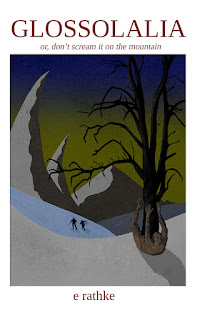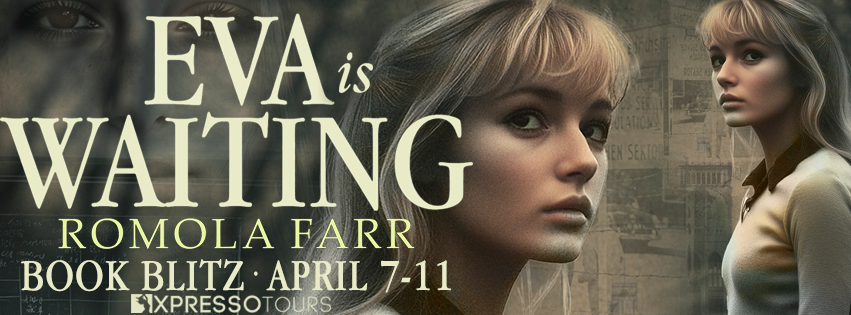
Glossolalia
by e rathke
GENRE: Fantasy
BLURB:
Purchase Glossolalia on Amazon
Add Glossolalia on Goodreads
Excerpt:
I
Umok was the first to see the boy. There was nothing special about the boy except that he wasn’t one of us and didn’t seem to be an Uummanuq. Not that anyone really knew, then, what the Uummanuq looked like. Not really. But he was too tall to be one of them and much too short to be one of us. Maybe strangest of all, he was dressed as a woman. One of ours, not the Uummanuq women, assuming anyone knew, then, what the Uummanuq looked like when they weren’t smashing our homes down. But he wore a loose, open vest, his trousers tight and reaching just past his knees. In his hands, a hidebound book.
It was a clear day, just past spring, and though the edge of the world is known for its deathly cold, our summers are quite warm. Warm enough to wade out into the sea and gather crabs or lobster. Or even to swim out to where the leviathans burst through the water, spraying the skies with their misted breath.
Umok was so distracted by the boy that she dropped her arm, accidentally flinging her gyrfalcon, Feo, to the ground. When Feo shrieked the way she does, the boy turned to Umok and smiled a big toothy grin. To hear Umok tell it later, the boy had fangs like a wolf and eyes that glowed with menace.
We’re not prone to superstition, but much changed that summer and especially come winter, when the days last barely a blink and the nameless ones call out to us in the long night, and mothers wake to missing children, never to be seen again.
But the boy didn’t stop when he saw Umok. It was like he had a set destination. Like he knew where we were. And maybe that’s the most shocking of all. That he just wandered out from the dark green summer mountains and walked right to our little village at the edge of the world with nothing but the clothes he was wearing, an empty book, and a mouthful of words that would change the shape of all our lives.
Worldbuilding is a Trap
Worldbuilding is dull. Worldbuilding literalises the urge to invent. Worldbuilding gives an unnecessary permission for acts of writing (indeed, for acts of reading). Worldbuilding numbs the reader’s ability to fulfil their part of the bargain, because it believes that it has to do everything around here if anything is going to get done.
Above all, worldbuilding is not technically necessary. It is the great clomping foot of nerdism. It is the attempt to exhaustively survey a place that isn’t there. A good writer would never try to do that, even with a place that is there. It isn’t possible, & if it was the results wouldn’t be readable: they would constitute not a book but the biggest library ever built, a hallowed place of dedication & lifelong study. This gives us a clue to the psychological type of the worldbuilder & the worldbuilder’s victim, & makes us very afraid.
I like The Silmarillion more than Lord of the Rings. In fact, I love it so much more than Lord of the Rings that if I were the type to have tattoos, I’d probably have one of Turin Turambar’s tragedy or Feanor burning his ships.
I would not get a tattoo of, like, Gimli.
I mention this because The Silmarillion, to its detractors (of which there are many), is only worldbuilding without narrative. I disagree, of course (maybe another thing to write about someday), but I’m sympathetic to that reading and to those who find it too difficult to get into. I’ve heard it compared to the Bible (which is actually a very good comparison) or an encyclopedia (not a good comparison, but, again, I’m sympathetic to, as the kids say, the haters) or a hastily thrown together and edited collection of notes and story fragments (I mean, it is this, exactly) but I think of it more as a mix of the Norse Sagas and Grimm’s Fairytales for a world I wish existed.
The reason I mention my love of The Silmarillion is because I also pretty firmly agree with M John Harrison above.
Worldbuilding is dorky and often gets in the way of story. Worse, sometimes it’s clear that a writer is far more interested in the dork stuff than the human drama. And a novel without that human drama is…well, it is just an encyclopedia.
Everything in a novel needs to serve the story, which means characters should always be front and center. Whether your genre is science fiction or fantasy or noir or literary (this absolutely is a genre and worldbuilding is absolutely a potential trap here as well—yes, I will one day write about Moby Dick), the characters are what matters, and everything else in a novel needs to make us either understand them better or obfuscate their motivations in a way that leads to dramatic tension.
What we definitely don’t need to know is why the flora and fauna is the way it is, how it functions (unless this information is in service of characterization or dramatic tension), or, like, the history of the ruling dynasty.
I’m sure it’s very interesting to you, dear writer. And trust me, I get it. I have fallen in love with my own words and worlds enough to write literally hundreds of thousands of words to make them real.
I understand, for example, why George RR Martin has written hundreds of thousands of words to build a history beneath his bestselling and genre-defining fantasy series. No one asked for it. No one even necessarily wanted it! They definitely didn’t want it instead of volumes six and seven of that fantasy series.
You know who wanted it?
I mean, besides all the obsessive idiots (me) who can’t get enough of this world.
The person who wanted it was George Martin.
And so we got it. And probably we’ll get more before the series (never) finishes.
I don’t like science fiction, generally. Not for lack of trying! Or maybe a better way to say it is that the promise of the genre is enormous, but I rarely enjoy science fiction novels. Yes, there are exceptions, but I would estimate that I finish less than half of the science fiction novels I begin and have enjoyed only a dozen or so science fiction novels in my life.
The biggest barrier for me, honestly, is the dorkiness. The obsessive construction of a world, its technologies. Sometimes it feels like the author didn’t really want to write a story. They just wanted to make schematics for spaceships or write a fictional engineering manual. Worst of all, so many of these science fiction novels seem so completely disinterested in their characters that they may as well not even be called novels. They’re just thought experiments populated by automatons who speak in stilted essays about imagined technologies.
I could list a lot of terrible science fiction books that exemplify this, but, like, can anyone who’s read an Asimov novel even deny this about him, specifically?
Like, I know Foundation is currently a TV show streaming on someone’s TV right now, but the reason people have called that series unfilmable isn’t because it’s so thematically dense or visually stunning but because the first book includes exactly zero characters. Most of the series barely even has characters!
If you wonder why I, Robot got made into an action thriller with Will Smith, it’s because to stay true to the text would be so monstrously boring it would make you want to kill yourself. Better to throw some Big Willie Style at it and hope it makes some money.
I think the biggest problem with the Science Fiction genre is, honestly, that Asimov is one of the defining progenitors. While Fantasy is usually blamed on Tolkien, the genre was pretty well established by the time he got there. And, like, for all Tolkien’s faults and his own nerdy obsession with his own world (the dude wrote a story solely to give a reason for his other nerdy passion: conlangs), at least he told a story. At least he wrote humanity into his story. For all the idealized heroism and power fantasy of certain characters (Aragorn), the series is also full of people who fail (everyone besides Aragorn?) and so much of the narrative is centered around human frailty and fallibility.
We don’t remember Frodo because he destroyed the Ring. We remember him because, at the very end, he chose to save the Ring. It’s only greed and frailty that leads to the Ring’s destruction.
And Frodo must live the rest of his life knowing he failed when it mattered most. And even so, even despite everything, he goes with the elves to be honored as one of the greatest heroes living.
Tolkien’s characters stick with us. Unfortunately, to too many writers of speculative fiction, it was the obsession with his own creation that left the biggest mark. It’s almost like they don’t even realize that Tolkien is Gollum and his Ring is his vast compendium of notes for a world that doesn’t exist.
And so we end up with a version of The Wheel of Time that is fourteen books instead of the planned six. We end up with people like Brandon Sanderson obsessively engineering rules to literal magic, which has inspired an entire generation of dorks to write their own intricate rule sets for magic. And, like, while this isn’t necessarily a problem, the resulting books don’t really fill me with hope for this brand of nerdism.
Buddy, listen, I love worldbuilding. I really do. I love it with the heart of a ten-year-old discovering Middle Earth for the first time. I love it with the obsessiveness of someone who owns literal books that function primarily as encyclopedias for fantastical worlds I fell in love with. And, like I said: I write this dorkiness myself. I know how easy it is to fall in love with imaginary people, imaginary worlds.
Here’s the good news: You can include all the dorkiness you’ve filled up your notebook with. You can throw it all in there!
The bad news is you need to be very clever about how you manage this. More than that, you need to actually be talented at the difficult parts of writing (making up worlds is easy): writing believable and engaging humans.
If you can make us care about the people in your book, you can get away with sneaking in tiny (seriously, I mean tiny) essays about, like, the bones of dragons that make the walls of that badass castle you’ve been dreaming of since you were eight.
If you’re remarkably clever and talented, you can even pull off what Sam Delany does in Neveryon. But maybe it’s better to think of Hemingway’s iceberg theory with regard to worldbuilding and, you know, just put your time, effort, and focus on the actual characters who inhabit your dorky world.

AUTHOR Bio and Links:
e rathke writes about books and games at radicaledward.substack.com. A finalist for the 2022 Baen Fantasy Adventure Award, he is the author of Glossolalia and several other forthcoming novellas. His short fiction will appear in Queer Tales of Monumental Invention, Mysterion Magazine, and elsewhere.

















































3 comments:
Thanks for hosting!
I love the cover and look forward to reading the book.
The excerpt sounds really intriguing and the cover is great.
Post a Comment